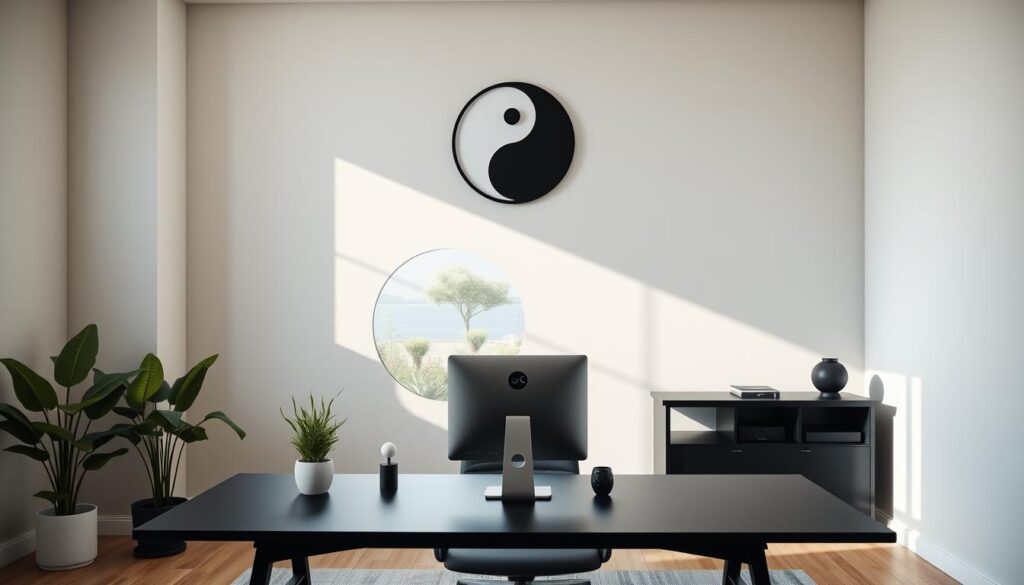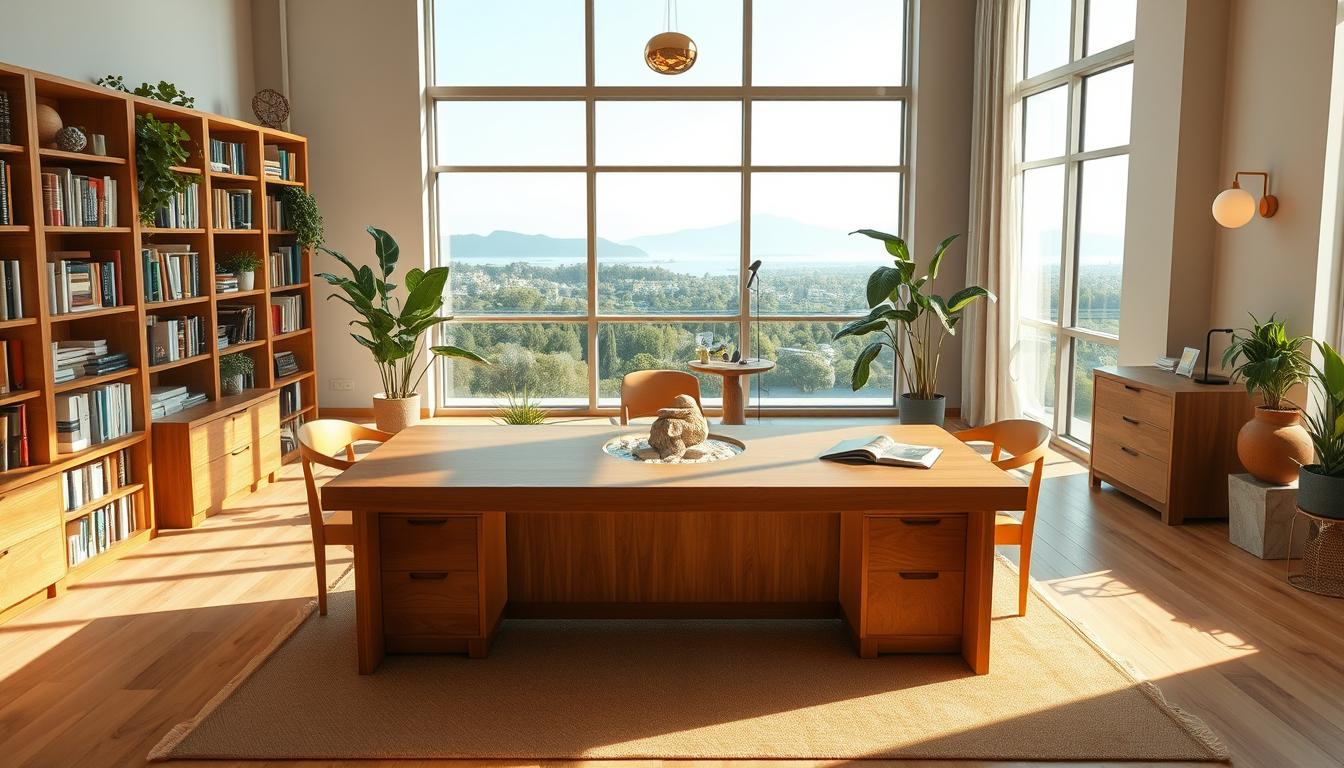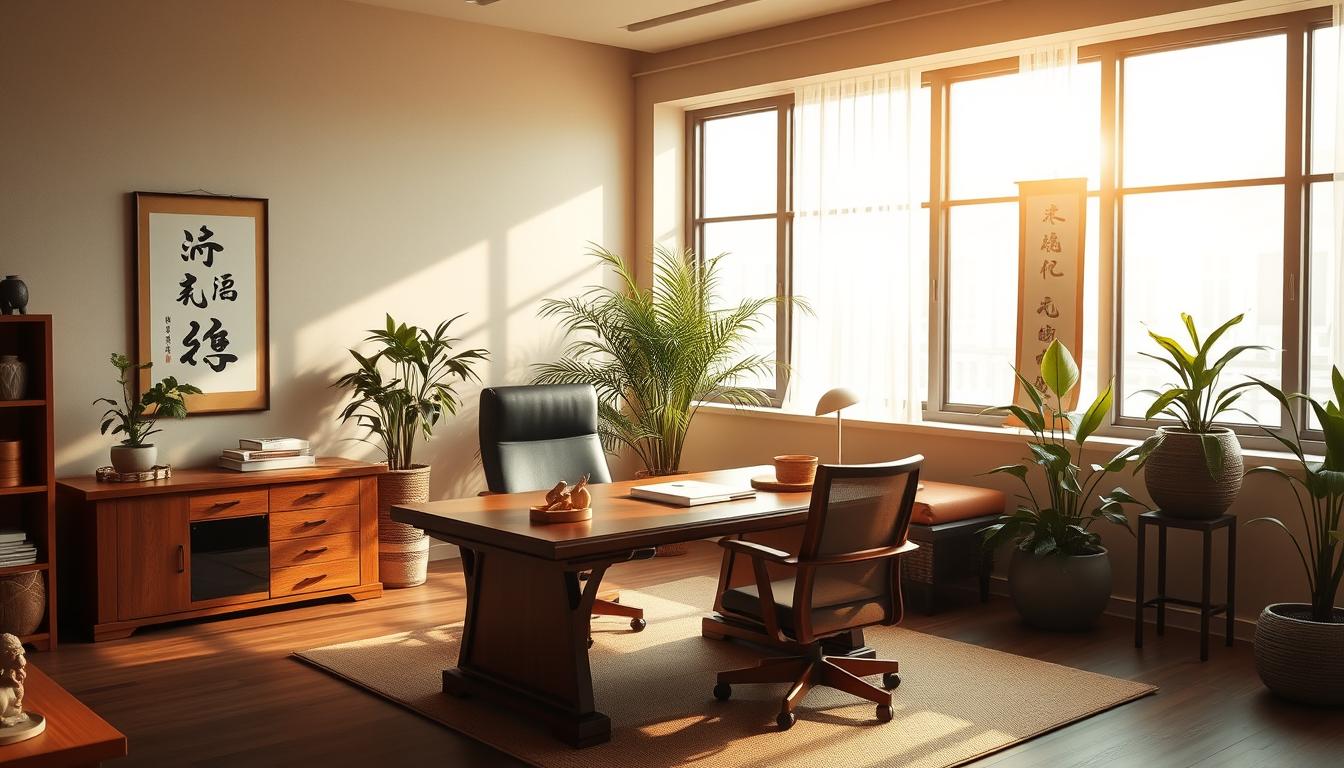Feng Shui is an old Chinese way of arranging space to make energy flow well. It’s called “chi” or “qi.” Using Feng Shui in your office makes it better and helps you do more. It turns your office into a place that helps you succeed and feel good.
Choosing decor and furniture that make energy move well is key. For example, put your desk where you can see the door but against a solid wall. This gives you control and confidence. Keep your area tidy and use comfy chairs. These tips boost positive energy and your work. This article will give you more tips on using Feng Shui in your office. It will help make your workspace not only effective but also welcoming.
Introduction to Feng Shui Principles
Feng Shui is an age-old Chinese method. It focuses on making a space’s energy flow well. This involves arranging things to affect chi, our vital energy.
Understanding Feng Shui’s main ideas can help make your office a better place. It creates balance, sharpens focus, and boosts creativity.
Understanding Feng Shui
Feng Shui is all about balancing yin and yang for peace and support. It involves five elements—Wood, Fire, Water, Earth, and Metal. Every element brings different energies, important to consider.
- Wood: Symbolizes growth and vitality. Adding plants can enhance chi.
- Fire: Encourages passion and inspiration through orange and red accents.
- Earth: Represents stability, achieved with a solid rectangular desk.
- Metal: Promotes joy and precision, often introduced with metallic decor.
- Water: Fosters wisdom and connection, often through water features or imagery.
Your desk should be in the “power position,” far from the door. This gives a clear view of the entrance.
Having a strong chair against a wall helps focus and work better. Keep spaces tidy and bright with natural light to let chi flow freely.
Choose calming colors like soft yellow, pale green, and blue-green. These create a balanced and calm space. Stay away from sharp angles and mess, as they block good energy. Thoughtful use of Feng Shui makes your workspace both effective and refreshing.
The Importance of Workspace Optimization
A well-optimized workspace boosts work performance and well-being. By applying Feng Shui, one can create a clear and stress-free environment. This leads to better productivity and peace, helping you perform at your best.
Enhancing Productivity through Design
Feng Shui improves focus and workflow. A tidy space keeps you organized and focused. For example, placing your desk in the command position gives you control and a good view of the entrance.
Adding natural elements like plants or mountain art inspires and calms you. Water features or metal sculptures, and colors like blue and white, create a balanced workspace. This balance is key for a productive and energetic environment.
Natural light and plants improve air quality and mood. Colors like blue and green boost calmness and growth, while red sparks passion. Ergonomic furniture and facing the entrance boost productivity.
Clearing clutter revitalizes your space, making it ready for creativity. Including the five Feng Shui elements—Wood, Fire, Earth, Metal, and Water—increases energy flow. This makes for a more productive and harmonious work environment.
Key Elements of Feng Shui Office Decor
Understanding the five elements of Feng Shui is key for a good and working office. Each element—fire, water, metal, earth, and wood—brings unique traits that affect your office’s vibe. By adding these elements to your office, you make a place that boosts focus and sparks creativity.
The Five Elements of Feng Shui
Each of the five elements has a special role in shaping your workspace’s energy:
- Wood Element: Use natural stuff like bamboo, rattan, or wooden furniture. Add potted plants or fresh flowers to make your space lively. Green or brown colors will make this element pop.
- Fire Element: Bring in warm colors such as red, orange, or purple to fire up excitement. Candles or small fireplaces can up this vibe. Bold and lively art or accessories will make your space dynamic.
- Earth Element: Go for earthy shades like beige, yellow, or terracotta. Use ceramics, clay, or stone to ground the room’s energy. A cozy rug or comfortable chairs make it welcoming.
- Metal Element: Add metallic touches with silver or gold, and maybe some mirrors or shiny surfaces. Geometric shapes or sleek furniture will give your office an organized look.
- Water Element: Use blues or blacks to bring calmness. Water features like fountains or aquariums add peace, while curvy decor adds flow and ease.
By using these five elements in your Feng Shui decor, you make an inviting and balanced workspace. This balance doesn’t just up your work game but also boosts your overall mood.
Desk Placement: Creating a Command Position
Choosing the right spot for your desk boosts workspace productivity. The command position is key to better energy and clarity at work. When you place your desk well, you feel in control, which helps your mood and work.
The Significance of Command Position
With your desk in the command position, you can see the door without being right in front of it. This spot makes you feel confident and helps you focus, which is vital for good work. Your desk should have a solid wall behind it. This shows strength and backs you up in your career.
- When unable to achieve this ideal desk placement, consider using a mirror to reflect the door or hang a Feng Shui crystal ball between you and the entrance.
- Avoid L-shaped desk configurations that face a corner, as they can hinder creativity and a sense of control.
- Your desk should not face a blank wall; using mirrors or expansive artwork can enhance your view and invite positive energy.
- Avoid positioning your desk directly facing a window to help maintain concentration and minimize distractions.
- For optimal energy flow, desk placement should be off-center from the door, ideally diagonally opposite it, empowering your workspace.
Keeping your desk in a commanding spot invites good chances and boosts your work. This smart way of setting your desk up uses Feng Shui to improve your office space.
Natural Light and Its Impact on Productivity
Natural light can change the feel of your workspace for the better. It boosts productivity and makes the space healthier. Daylight lessens eye discomfort and improves mood, which helps you work better. To make the most out of sunlight, here are tips to increase *natural illumination*.
Harnessing Natural Illumination
Place your desk near windows to get more sunlight. But, don’t sit right in front of them to avoid glare and distractions. Use light curtains or blinds to let sunlight in while keeping your privacy.
- Avoid heavy curtains or dark shades as they block light and hinder the flow of positive energy.
- Incorporate mirrors in your decor to reflect and amplify natural light, creating an illusion of more space.
- Choose light colors for walls and furniture to enhance brightness and maintain a soothing atmosphere.
- Use reflective materials like glass or metal to bounce light around the room, increasing overall brightness.
- Add plants and greenery; their integration with natural light promotes workspace wellness and boosts creativity.
*Natural light* energizes your workspace and makes you more optimistic about work. Spending too much time under artificial light can make you tired and less focused. Fresh air and natural elements help keep your mind clear and improve your job performance.
Improving your workspace with natural light is in line with Feng Shui. It creates a peaceful and effective work environment. This helps you succeed and feel good while working.
Balancing Yin and Yang Energies in Your Office
A balanced workspace needs the right mix of yin and yang energies. Yin brings a calm, soothing vibe. Yang adds activity and brightness. Together, they help make an office where you can be creative and focused.
The Role of Yin and Yang
Choosing a variety of materials and colors for furniture keeps these energies in sync. How you position your desk is key. Make sure it allows energy to flow smoothly and avoid placing it near doors or in tight spots. This creates a feeling of openness.
Use earthy or soft blue and green colors to keep the atmosphere balanced. These colors make the office feel calm without the distraction of bold colors. A tidy space with plenty of storage also helps energy move freely, making work easier.

Add natural touches like wood desks and plants to bring in positive energy. Too much yin might make you feel too relaxed, while too much yang could lead to stress. Balance is key.
For a well-balanced office, mix cool colors and gentle lighting with lively colors and dynamic items. Adjustable lights can change the energy as needed. And, don’t forget plants. They add yang energy and complete the balance, making the office welcoming.
Incorporating Natural Elements into Your Decor
Adding natural elements to your office makes it a refreshing place that helps you work better and feel well. Use things like biophilic design to bring the outdoors in, matching the Feng Shui principle. Stuff like plants and water features can really change how a room feels.
Benefits of Nature in the Office
Putting nature in your office has many benefits:
- Incorporate plants like lucky bamboo or a money tree in the east or southeast to activate the wealth corner, encouraging abundance.
- Add a small water fountain in the north to enhance career focus and create a calming environment.
- Use sunflowers in a clay pot in the northeast to symbolize earth elements, cultivating knowledge and creativity.
- Include metal accents in the west to foster teamwork and helpful interactions.
- Maintain a clutter-free space to promote smooth movement and balance according to Feng Shui principles.
- Choose plants such as peace lilies, spider plants, and bamboo to improve air quality and energy flow.
Having your desk close to windows is good for getting more natural light. This helps keep you positive and clear-minded. Using natural materials like wood and stone makes the place feel steady and warm. Water features and colors like browns and beiges make it a peaceful spot. Mirrors can spread light around, making the room feel more open and letting Chi flow better. Even a little fountain on your desk can boost your space’s vibe a lot.
Utilizing Clutter-Free Spaces for Enhanced Focus
A clutter-free workspace boosts productivity. Clear surfaces allow positive energy to flow, enhancing focus and clarity. Tidiness aids concentration, lowers stress, and keeps distractions at bay.
Decluttering for Clarity
Effective Feng Shui involves decluttering your office. You can do this by:
- Checking your desk regularly and removing things you don’t need.
- Using desks with drawers or hidden shelves for better organization.
- Making sure the floor is clear to let Chi flow and improve focus.
Consider a convex mirror if your desk’s placement isn’t ideal. It offers a clear view of the entrance and reduces distractions. This helps create a productive environment.
A clutter-free workspace improves focus and looks better for clients. It enables employees to perform well by providing easy access to necessities. Cleanliness and organization can significantly boost overall performance.
Choosing Colors Wisely for a Harmonious Environment
The colors in your workspace change its vibe and energy. Using Feng Shui to pick colors can make your office a supportive space. Different colors stir different feelings and uses, letting you design your workspace for better work and peace.
Color Psychology in Feng Shui
Knowing how Feng Shui colors affect your workspace is key. Here are some important colors:
- Blue: Known for promoting calmness and intellectual focus, blue enhances productivity and is ideal for professional settings.
- Green: This color symbolizes balance, harmony, and growth. It tends to benefit industries like healthcare and technology.
- Red: Associated with energy and motivation, red can stimulate urgency. Use sparingly to avoid added stress.
- Brown: Conveying warmth and reliability, brown works well in environments like law and construction offices.
- Black: Often used as an accent, black signifies sophistication and efficiency.
- White: This color creates a clean and calming atmosphere. Ideal for healthcare and minimalist design.
- Yellow and Orange: These colors boost creativity and positivity. Use them in moderation to avoid distraction.
- Purple: A mix of blue’s stability and red’s energy, purple brings luxury and creativity.
The strength and lightness of colors change how we feel. Cool shades like blue and green encourage relaxation. Warmer colors like red and yellow increase energy. Soft earthy colors provide a grounded feel.
Metal tones, like white and gray, make things clearer and balance your decor. The bagua map shows that placing colors can improve energy flow for your goals. Use blue for career growth and red to gain recognition.
Adding accent colors that you like can make a nice, Feng Shui-friendly space. In a home office, colors like blue for focus, green for balance, and yellow for happiness can enhance creativity and work.
Feng Shui Office Decor: Practical Tips and Strategies
Adding Feng Shui to your workspace boosts productivity and peace. By applying specific Feng Shui tips, you can turn your office into a place of high efficiency. These strategies align your space with positive vibes, making it look good and feel supportive.
Implementing Feng Shui in Your Space
Start by putting your desk in a powerful spot, facing the entrance but not directly in line with it. This boosts your confidence and control. Choose a solid desk and a comfortable chair for stability and support.
- Avoid placing your desk under beams or straight across from doors to lessen stress.
- Use a bookcase as a divider in shared spaces to claim your area.
- Add soft pastels or white for creativity and green for growth in your decor.
- Decorate the “wealth corner” with green, purple, or gold elements and plants.
Good lighting is key for energy. Have plenty of light for your tasks, using natural light if you can. Stay away from harsh fluorescent lights as they can make you feel bad. Keep your desk tidy daily for a clear start each morning.
Plants like the Chinese money plant or succulents make your office look nice, clean the air, and lower stress. For team areas, choose round tables to help everyone talk and share openly. Mirrors can make the space feel bigger and brighter, but don’t put them behind your desk or facing the entrance to keep the energy right.
Conclusion
Feng shui office decor can make your workspace look better and work better. Putting your office together in a way that promotes energy flow makes it welcoming and boosts productivity. Choosing the right spot for your desk, using certain colors, and bringing in nature helps make your office a better place to achieve your goals.
Using furniture that can change to suit different needs shows off your brand’s values. It makes the welcome area work better and feel more inviting. Managing clutter is also key to keeping your workspace clear and full of energy. A tidy space helps you think clearly, be more creative, and work more efficiently.
Adding feng shui to your office is about creating a place that helps you grow, both personally and professionally. Paying attention to things like the color and material of your desk, and how you arrange your decor, is a big step. This makes your workspace more refreshing and supports well-being. Try these feng shui tips and see the positive change in your office environment.
FAQ
What is Feng Shui and how does it apply to office decor?
How does desk placement affect Feng Shui in the office?
What are the five elements of Feng Shui, and why are they important?
How can I improve the natural light in my office?
What does it mean to achieve balance between yin and yang in the office?
Why is decluttering important in a Feng Shui office?
How do colors influence Feng Shui in the office?
What practical tips can I implement for Feng Shui in my workspace?
Content created with the help of Artificial Intelligence.



